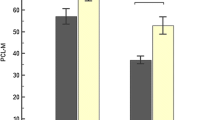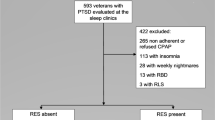Abstract
Post-traumatic stress disorder (PTSD) and nightmares are major psychiatric problems among veterans with combat experience. Veterans who have obstructive sleep apnea (OSA) have increased nightmares while sleeping on their back. Treatment of sleep apnea with a continuous positive airway pressure (CPAP) device lessens the arousals from sleep, and patients do not remember their nightmares as they sleep through their dreams. The case report describes a veteran who had severe nightmares especially when sleeping on his back. He was diagnosed with sleep apnea and treated with auto CPAP. During the follow-up visit, the patient reported a dramatic improvement in his PTSD symptoms, nightmares frequency, and intensity. He also reported feeling better, less sleepy, and more energetic during the day. Besides, he reported experiencing no nightmares when using CPAP and improvement in his quality of sleep. He also reported an improvement in daytime functioning and quality of life.
Access this chapter
Tax calculation will be finalised at checkout
Purchases are for personal use only
Similar content being viewed by others
References
Dement W, Kleitman N. The relation of eye movements during sleep to dream activity: an objective method for the study of dreaming. J Exp Psychol. 1957;53:339–46.
Youakim JM, Doghramji K, Schutte SL. Posttraumatic Stress Disorder and Obstructive Sleep Apnea Syndrome. Psychosomatics. 1998;39(2):168–71.
Ross RJ, Ball WA, Dinges DF, Kribbs NB, Morrison AR, Silver SM, et al. Rapid eye movement sleep disturbance in posttraumatic stress disorder. Biol Psychiatry. 1994;35(3):195–202.
Tamanna S, Parker JD, Lyons J, Ullah MI. The effect of continuous positive air pressure (CPAP) on nightmares in patients with posttraumatic stress disorder (PTSD) and obstructive sleep apnea (OSA). J Clin Sleep Med. 2014:631–6.
Author information
Authors and Affiliations
Corresponding author
Editor information
Editors and Affiliations
Rights and permissions
Copyright information
© 2019 Springer Nature Switzerland AG
About this chapter
Cite this chapter
Abraham, S., Cooper, S., Khawaja, I.S. (2019). Case Study: Post-traumatic Stress Disorder “I Am Having Nightmares on My Back”. In: Khawaja, I., Hurwitz, T. (eds) Comorbid Sleep and Psychiatric Disorders. Springer, Cham. https://doi.org/10.1007/978-3-030-11772-6_2
Download citation
DOI: https://doi.org/10.1007/978-3-030-11772-6_2
Published:
Publisher Name: Springer, Cham
Print ISBN: 978-3-030-11771-9
Online ISBN: 978-3-030-11772-6
eBook Packages: MedicineMedicine (R0)




